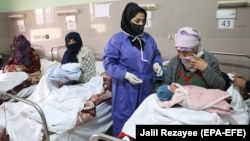Every two hours. That's how often a woman dies during childbirth in Afghanistan.
The staggering maternal mortality rate is one of the highest in the world. And under the repressive rule of the Taliban, the situation is only getting worse.
Among the victims was a young woman who died during childbirth in her village in the northwestern province of Badghis in December.
"Both my sister and her unborn child died," said Fereshta, the woman's sister. "There are no midwives or any health centers in our area."
Fereshta did not name her sister, who she said was in her 20s and had three young children.
In Afghanistan, at least 638 mothers died for every 100,000 births, according to the UN figures for 2024. The real number could be even higher as some cases go unreported, especially in remote areas.
The UN said many of the deaths were due to preventable pregnancy complications exacerbated by severe shortages in qualified birth attendants and an under resourced health-care system.
Rising Maternal Deaths
The maternal mortality rate in Afghanistan was 1,346 for every 100,000 births in 2000, during the Taliban's first stint in power. The ratio dropped to 629 in 2020 due to generous international support and development aid.
But since the Taliban regained power in 2021, the number of deaths during childbirth has increased again.
The public health-care system in Afghanistan, which was largely funded by foreign aid for nearly two decades, has been in freefall since the Taliban seized power and international donors immediately cut financial funding.
While some foreign aid organizations continue to operate in Afghanistan, many of them have been forced to curb their work as international funding diminishes.
In a major blow, the United States, the largest foreign donor, paused its humanitarian assistance to Afghanistan in January.
The UN estimates that the absence of the US aid in Afghanistan could result in 1,200 additional maternal deaths between 2025 and 2028.
Exacerbating the situation, the Taliban has banned women from attending university and severely restricted their job opportunities, including in the health sector.
In December, the hard-line Islamist group banned women from attending medical institutes that offered classes in midwifery, nursing, dental hygiene, and laboratory science.
Tom Fletcher, the UN undersecretary-general for humanitarian affairs and emergency relief coordinator, said the ban is set to prevent more than 36,000 midwives and 2,800 female nurses from joining the country's health sector in the foreseeable future.
Taliban 'Does Not Care About Women's Health'
A midwife at Kabul, who spoke to RFE/RL on condition of anonymity for fear of retribution, said the Taliban "does not care about women's health, as if this issue does not exist."
The woman, who has worked in state hospitals for more than two decades, said women's lack of access to information about maternal health is also an ongoing issue.
The high maternity rate in Afghanistan, she said, "is not only about a lack of access to a clinic or a midwife during childbirth."
"Expectant mothers should be under constant monitoring of clinics from the early stages of pregnancy," she added. "But in many cases in Afghanistan, even in big cities, pregnant women come to hospital only when they have some major health issue or only to give birth."












